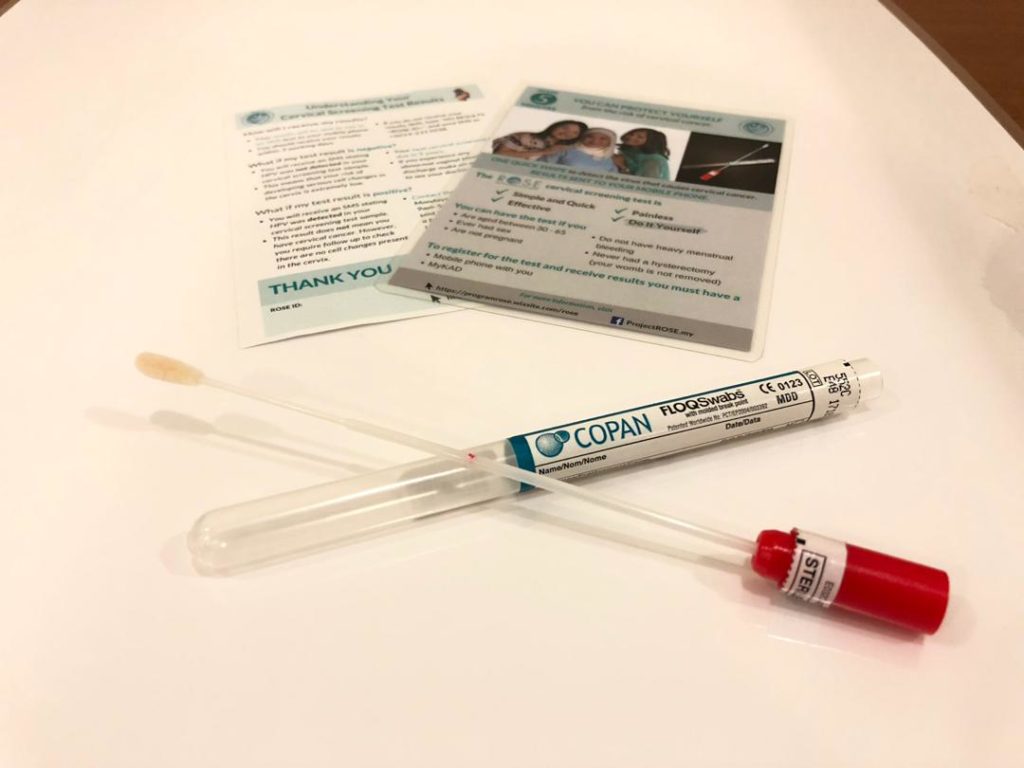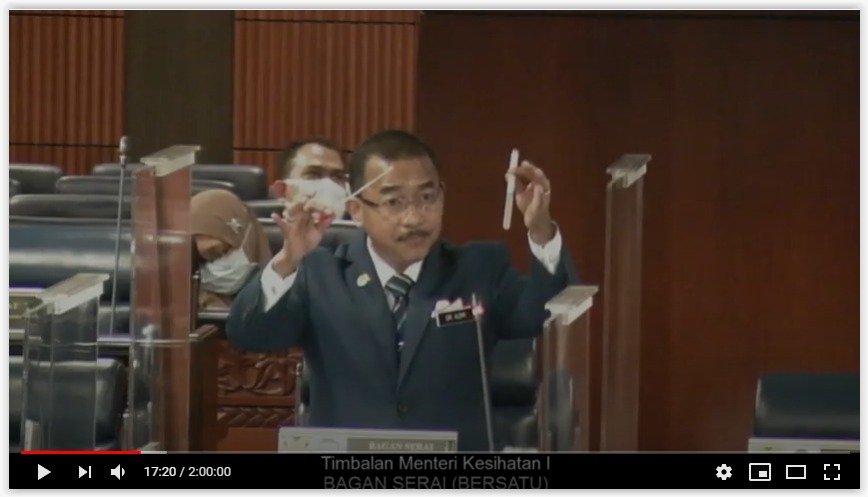KUALA LUMPUR, August 10 — Deputy Health Minister Dr Noor Azmi Ghazali encouraged women to use an HPV self-sampling test for cervical cancer, as he demonstrated a test kit in Parliament today.
Dr Noor Azmi pointed out that although government clinics provide pap smears for free, 60 per cent of women did not undergo pap smears for the past three years, while 25 per cent of women did not know of other methods of cervical cancer screening, according to the 2019 National Health and Morbidity Survey.
He also noted that the Ministry of Health (MOH) has recorded 25 per cent of pap smear check-ups only in 2019, compared to its target of 40 per cent.
As a trained doctor, Dr Noor Azmi said pap smears were not comfortable and may be painful for some women. During a pap smear, a woman lies on her back on the examination table, with her legs spread and feet up on stirrups, as a health professional inserts a speculum into her vagina and uses a tool to scrape a small sample of cells from her cervix.
“Many women are embarrassed, some are afraid, maybe some also do not care,” Dr Noor Azmi told the Dewan Rakyat today during Question Time.
“The government has approved a screening method, which is the HPV test. The HPV test has been done in phases, and a pilot study was done in 2019 in four states. God willing, with good results, it will be expanded to four more states and the government hopes to continue this effort by 2023 and fully adopt the HPV test as the cervical cancer screening method,” he added.
Dr Noor Azmi highlighted that the pilot study conducted in Putrajaya, Kuala Lumpur, Kelantan and Kedah recorded a remarkable achievement as 98 per cent of women were able to do the test by themselves using the HPV test. Thus, he said MOH aimed to expand the pilot study to four more states in the country.
The deputy health minister then took out a self-administered HPV test kit by the ROSE Foundation, a Malaysian cervical cancer screening programme, as he said: “This is a HPV testing programme where they can do it themselves, with guidance. It’s not painful, it’s easy, and there’s no need to be scared”.
He demonstrated to MPs in the Dewan Rakyat how individuals could use ROSE’s HPV test themselves, as he pulled the swab stick out from the container, twisted the swab stick, which he said must be turned 10 times, removed from the vagina, replaced into the container, and handed to the health worker.
“It’s as easy as that.”
Dr Noor Azmi said this was the latest cervical screening testing method in the world, like in Australia, with high testing rates. “With this, one day God willing, we can eliminate cervical cancer and save lives.”
“If they test positive, we’ll straight away refer them to an oncologist as early as possible for early treatment. The HPV test is done only once every five years, whereas a pap smear is done every three years, with low testing rates.”
The HPV test discovers the presence of the human papillomavirus in women’s cervix that leads to the development of genital warts, abnormal cervical cells or cervical cancer, whereas pap smears look for abnormal cells in the cervix. HPV tests are said to be more effective and accurate than pap smears.

ROSE Foundation medical technical advisor Dr Woo Yin Ling said last February that ROSE provides the HPV tests, which are more expensive than pap smears, for free to government clinics, but other women can buy the kit for RM250. Test results are sent to women’s mobile numbers in three weeks. If results are abnormal, ROSE will link the women up to a government hospital for follow-up so that women don’t get “lost in the system”.
The ROSE programme has screened 8,000 low-income women throughout Malaysia after its launch in January 2019. The ROSE Foundation and Laboratory, located at UMXcelerate complex at the Universiti Malaya campus, are a partnership between the public university and Australia’s VCS Foundation, a cancer prevention non-profit.
Dr Noor Azmi mentioned today that cervical cancer is ranked as the third most common cancer among women in Malaysia.
“Pap smear screening is not included as part of the screenings under Peka B40. There are various MOH agencies that conduct cervical cancer screening through the pap smear technique. All public health clinics and MOH hospitals, including rural clinics, are providing the service,” he told Hulu Selangor MP June Leow Hsiad Hui, who had asked about the feasibility of providing pap smears for women eligible for the government’s Peka B40 health screening programme.
“The National Population and Family Development Board (LPPKN), Social Security Organisation (Socso), university hospitals, non-governmental organisations like Federation of Reproductive Health Associations, Malaysia (FRHAM) and National Cancer Society of Malaysia, clinics under local authorities like in Penang and Selangor as well as Malaysian military hospitals are providing this service too,” he added.
Dr Noor Azmi also said the incidence of cervical cancer in Malaysia was 6.2 people per 100,000 population compared to breast cancer at 34.1 per 100,000 population.
“Therefore, breast cancer screening is given priority to include as part of the health screening benefit package under Peka B40,” he said, adding that Peka B40 also provides incentives to complete cancer treatment at MOH hospitals and transport incentives for cancer patients.
According to him, with an initial budget of RM20 million despite the then-Pakatan Harapan government promising RM100 million, MOH needed to limit the form of assistance that can be provided through the government’s Peka B40 health screening programme based on needs.
Dr Noor Azmi noted that the Perikatan Nasional government has given Peka B40 an extra allocation of RM50 million.








